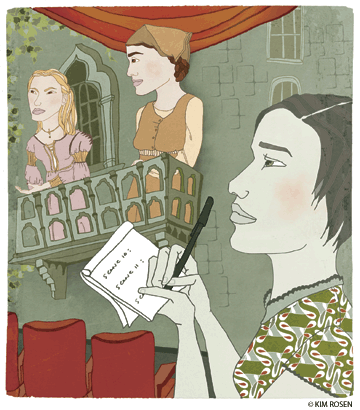In Playwriting Fellowship, The Process is the Thing

STUDENT ACTIVITY | If a student wanted to test a hypothesis in cognitive psychology, she could run an experiment in the Solomon Laboratories. Likewise, anthropology majors have the opportunity to polish their senior theses with individual research, while electrical engineering students work together to draft designs. Aspiring authors can stop by the Kelly Writers House for constructive criticism, and talented biologists have research grants at their disposal.
Until recently, however, playwrights at Penn could only develop their craft insofar as their works remained flat words on a page. This spring the Front Row Theatre Company, Kelly Writers House, and the creative writing program introduced a new playwriting fellowship that offers playwrights the opportunity to see their work transformed into a three-dimensional production.
“The specific form of the fellowship—a week’s worth of workshopping a play with the help of actors and a director—is really helpful to any playwright who wants to develop and revise a promising play,” says Kelly Writers House Director Jennifer Snead C’94. “It was essentially the idea of the Front Row Theatre Company. They came to me last fall to see if the Writers House would like to be a cosponsor, and of course I said yes, as it’s a fantastic idea.”
The Front Row Theatre Company, formerly known as the Arts House Theatre Company, is a student-run company “dedicated to cutting edge, socially relevant theater.” Charles Forster EAS’05, the technical director of Front Row, describes how the idea for a playwriting fellowship arose: “The way that Front Row currently works, we produce three student-directed shows each year, and we do not have any good avenues to connect with playwrights. So I went on a crusade to create some way for Front Row to start the long process of developing plays on campus.”
Performance groups prefer older plays that have benefited from years of development, Forster explains, while new plays are shelved and not given a chance to evolve. “A play is transformed by performance, and the playwright alone cannot predict what the play will be like on stage. In order to develop new work you have to see it, you have to have actors and directors thinking about it, and you have to try new things with it.”
The winner of the 2004-05 playwriting fellowship was Yael Miller C’05. Her play, Juliet’s Nurse, was Front Row’s first experiment in workshopping a script written by a fellow Penn student. An “Ovidian interpretation” of Romeo and Juliet, it focuses on the relationship between Juliet and her nurse. “I got started on this play because I was annoyed,” says Miller. “The nurse is always portrayed as over 50 and unattractive. This doesn’t make sense given that Juliet’s 14. So then I wondered, what if the nurse was sexy? This would change the dynamics a little. Juliet has to respond differently to someone closer to her own age who’s sexy.”
Watching Front Row rehearse her play enlightened Miller: “I realized how much I needed actors. One of the biggest things I’ve learned is that it’s hard to visualize how actors move. By the end of the [workshop], almost all of my stage directions were gone. In the future I’ll keep them simple, onlyenter and exit, just like Shakespeare.”
The actors’ feedback also added more layers of meaning to Juliet’s Nurse. Miller remarks on how Cara Suvall, who played the title role, offered another perspective on Nurse’s character: “Cara said she saw Nurse living her own childhood through Juliet. This was something I hadn’t thought of.”
Suvall, a sophomore studying political science and comparative literature, carefully analyzed Miller’s reinterpretation of the Nurse. “I viewed the nurse as essentially composed of two opposing impulses,” she says. “The first is that she wants to protect, nurture, and teach Juliet, and the second is that she wants both affection from Juliet and to have power over her.”
According to Suvall, the workshop allowed her to have more of a stake in the play’s production. “This workshop was very different from [my] past acting experiences,” she says. “Generally, one just assumes that a play is set in stone and that you have to work with what you have. With this, however, we were able to view the script as a work in progress. Instead of forcing a certain dialogue to work when it doesn’t, we could share our thoughts about why we don’t think our characters would say certain lines. There was an entirely new dimension of creativity added because we had to think about how the characters within the world of Juliet’s Nurse would act.”
Indeed, the play underwent a kind of metamorphosis during rehearsals. “The workshop is really not focused around presentation, but around the process of shaping the play,” says Forster. “To that end, we tell the company to try all of the things that they think will not work, because now is the time to know for sure. You want to be prepared to be brutal with the work, as well as creative and open to new ideas. The hope is that the workshop will prepare a play to be produced on a larger scale, and that sometimes Front Row will be able to parlay the workshop plays into our season.”
Whether the fellowship will continue to be offered depends on securing an endowment, but the experience was certainly valuable to the first recipient. Miller, who had written Juliet’s Nurse four years ago, says the workshop helped her “gain some dignity.” She had felt a little embarrassed after hearing it read aloud at a UCLA playwriting retreat she attended during the summer after her freshman year; another discouraging experience in New York caused her to put the play aside for a year. Working with Front Row made Miller more confident about Juliet’s Nurse. “This workshop changed my attitude toward the play,” she says. “I could finally say, ‘This is good. I like it.’”
—Chelsea Tanimura C’06




